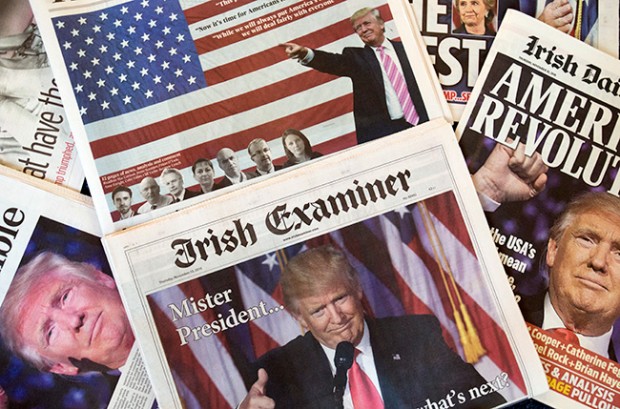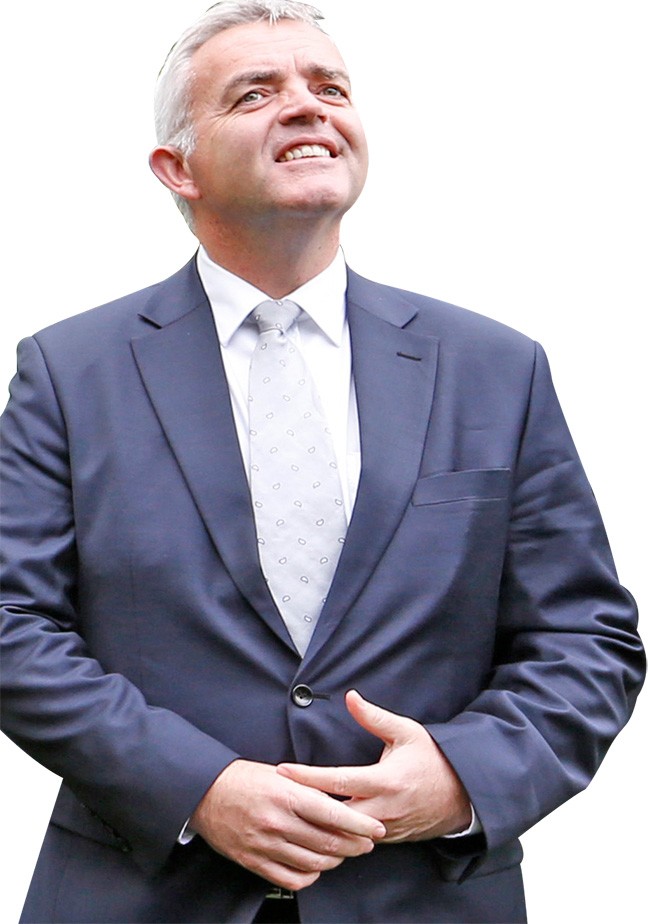13 February 2017 Edition
Fascism’s dark entertainment

• US President Donald Trump – grabbing the news like no other
There is a deep irony in listening to 'Morning Ireland' hosts wringing their hands at the decline of trust in traditional media
YOU CAN’T get away from him. He’s the elephant in the room – or the bull in the china shop.
The relentless media concentration on the personality of US President Donald Trump is understandable, particularly in light of the statement by a group of psychologists from Harvard Medical School and the University of California to President Obama “expressing their grave concerns” over the mental stability of the man with his finger on the nuclear button.
Of course, while darkly entertaining, such a narrow focus serves not merely to distract from the real effects of his dangerous policies but also clouds important lessons arising from the US election.
These include the failure of liberalism to offer coherent solutions to the crisis in US capitalism, a failure which partly made a Trump victory inevitable – a failure crowned by the choice of Hillary Clinton over Bernie Sanders as the Democratic Party candidate to challenge Trump.
RTÉ analysts have been all at sea trying to explain Trump’s success, revealing again the hermetically-sealed echo chamber the station has inhabited for decades.
Despite the newsroom squeamishness around Trump, RTÉ deference to the US continues unabated. On the day of his inauguration, the 9pm TV news ended with the American national anthem and scenes of Trump’s moment of glory. Can we expect this to be repeated on the elevation of leaders in other countries?
While the media, in general, has been filled with dark tales of alleged Russian interference in the US election, none that I noticed pointed to the long (and verified) record of US meddling in other countries’ elections.
And speaking of Russians, the skewed nature of international news coverage in Ireland was underlined by the relegation of the assassination of the Russian Ambassador to Turkey to fourth or fifth item on RTÉ’s Six One News. Does anyone seriously think this would be the case if a US or British Ambassador was murdered?
An amusing aside to depressing evidence of incipient fascism in the US and Europe has been the misplaced Irish media’s sniffiness regarding the Trump-era phenomena of ‘fake news’.
There is a deep irony in listening to Morning Ireland hosts wringing their hands at the decline of trust in traditional media when you consider that, for decades, RTÉ rigorously implemented overt political censorship and had its current affairs programming dictated by a ‘secret’ political faction with occasional token protests by the station’s presenters.
The ghost of Section 31 broadcasting censorship is clearly difficult to exorcise at Montrose. For instance, what justification was there in RTÉ News including details of a gun attack on a PSNI officer in the same report as the appointment of Sinn Féin’s new leader in the North, Michelle O’Neill?

• Mud slinging at DUP ex-minister Jonathan Bell
RTÉ’s Northern correspondent has also claimed that the DUP merely “mismanaged” the scandalous Renewable Heat Incentive scheme. What qualifies an RTÉ journalist to make such an adjudication? In the absence of a full and proper inquiry, how can anyone dismiss the idea of corruption by DUP figures?
The same report included the extraordinary and loaded claim that DUP former minister Jonathan Bell was merely “throwing mud” in the Assembly when he was, in fact, pointing to direct connections between DUP members and inviduals in the RHI 'Cash for Ash' scandal.
Finally, is there any clearer indication of the interests served by the Establishment media than the contrasting coverage of the legacy of recently-deceased former civil servant TK Whitaker and the political record of Martin McGuinness on the latter’s resignation as deputy First Minister?
While McGuinness’s outstanding role as statesman, peacemaker and reconciler was constantly coupled with criticism of various IRA actions during the conflict, there was a complete absence of critical analysis of Whitaker.
Hagiographic comment credited Whitaker with “creating modern Ireland” – dubious praise in a state riven by a chronic housing shortage, a dysfunctional health service and an economy unresponsive to the needs of its people.
Ireland has witnessed repeated waves of emigration since publication of Whitaker’s Programme for Economic Expansion in 1958.
His approach was a classic example whereby native elites of former colonies opt for the tender mercies of foreign capital ahead of developing indigenous state industry. This policy led to an economy overly reliant on Foreign Direct Investment.
In many ways, Whitaker was the father of Irish neo-liberalism, which has wrought such pain on average working people.
He is also ‘credited’ with having control of Jack Lynch’s Northern policy, writing all his major speeches on the issue and, according to a recent piece in the Irish Times, resented praise of Gerry Adams’s central role in the Peace Process. Enough said.




